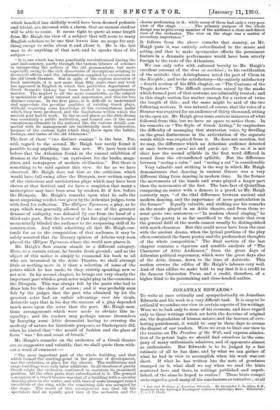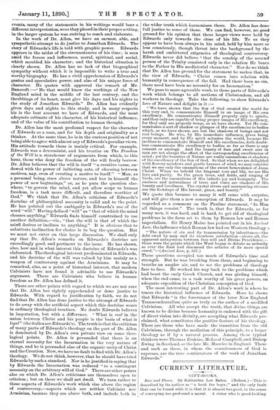JONATHAN EDWARDS.*
To write at once critically and sympathetically on Jonathan Edwards and his work is a very difficult task. It is easy to be critical if we confine our view to certain aspects of his writings. Were we to look only to some of his sermons, and have regard only to those writings which set forth the doctrine of original sin, the degradation of human nature,and the horrors of ever- lasting punishment, it would be easy in these days to arouse the disgust of our readers. -Were we-even to limit our view to the treatise on The Freedom of the Will, and express admira- tion of its potent logic, we should find ourselves in the com- pany of many enthusiastic admirers, and of opponents almost as enthusiastic. But Edwards is to be judged by a fair estimate of all he has done, and by what we can gather of what he had in view to accomplish when his work was cut short. If what he has written has the note of greatness stamped on it, what shall we say when we read the hints scattered here and there, in writings published and unpub- lished, of the aims he hoped to realise ? These hints compel us to regard a -good many of his conclusions as tentative ; at all • Life and Tfrritings of Jonathan Edwards. By Alexander v. G. Allen, D.E., -Professor in the Episcopal Theological School in Cambridge, Mass. Edinburgh : . T. and T. Clark.
events, many of the statements in his writings would bear a different interpretation, were they placed in their proper setting, in the larger system he was striving to reach and elaborate.
In the work of Dr. Allen, we have an earnest, able, and sympathetic attempt to do justice to Jonathan Edwards. The story of Edwards's life is told with graphic power. Edwards appears in the midst of the circumstances of his time ; is seen amid the forces and influences, moral, spiritual, and social, which moulded his character; and the historical situation is clearly shown. Dr. Allen has no lack of that biographical sympathy without which it is impossible to write a true and worthy biography. He has a vivid apprehension of Edwards's genius and speculative power, and also of his unique force of character. He quotes with approval the remark of Mr. Bancroft :—" He that would know the workings of the New England mind in the middle of the last century, and the throbbings of its heart, must give his days and his nights to the study of Jonathan Edwards." Dr. Allen has evidently given days and nights to this study, and in many respects his is the best account we have of Edwards, and the most adequate estimate of his character, of his historical influence, and of the value of his contribution to human thought.
Dr. Allen has the most profound respect for the character of Edwards as a man, and for his depth and originality as a thinker. At the same time, he is in the curious position of not being able to agree with almost any of Edwards's peculiar views. His attitude towards these is mainly critical. For example, Edwards was a determinist, and his treatise on The Freedom of the Will is a storehouse of arguments from which, to this hour, those who deny the freedom of the will freely borrow. Dr. Allen believes that the will is itself " a creative cause, en- dowed with the power of initiating acts, of choosing between motives, nay, even of creating a motive to itself." " Man, as a personal being, rises above nature, and has in himself the power of new beginnings," or, as he puts the question else- where, " to govern the mind, and yet allow scope to human freedom, is a task more difficult, and therefore worthier of God." We think that Dr. Allen's criticism of Edwards's doctrine of philosophical necessity is valid and to the point. He has pointed out the ambiguity in Edwards's use of the word "will." Having defined "will" as " that of which the mind chooses anything," Edwards finds himself constrained to use another definition,—viz., " that the will is that of which the mints desires or inclines to anything." It is obvious that to substitute inclination for choice is to beg the question. But we must not enter on this large discussion. We shall only say that Dr. Allen's remarks on Edwards's doctrine are exceedingly good, and pertinent to the issue. He has shown, also, how and in what interest this doctrine of Edwards's was elaborated. The theological interest predominated in Edwards, and his doctrine of the will was valued by him mainly as a weapon of controversy against the Arminians. It may be remarked, also, as a point of historical interest, that modern Calvinists have not found it advisable to use Edwards's argument. There are Calvinists who believe in human freedom as Dr. Allen has defined it.
There are other points with regard to which we are not sure that Dr. Allen has rightly apprehended or done justice to Edwards. With regard to justification by faith, we do not find that Dr. Allen has done justice to the attempt of Edwards to do away with the artificial aspect which this doctrine wears in ordinary theological treatises. No doubt Edwards believes in imputation, but with a difference. " What is real in the union between Christ and his people is the basis of what is legal" (the italics are Edwards's). The truth is that the criticism of many parts of Edwards's-theology on the part of Dr. Allen is dominated by Dr. Allen's own private view on some theo- logical points. Dr. Allen is persuaded that there is an eternal necessity for the Incarnation in the very nature of things, and he is persuaded also of the organic unity of Christ and the Creation. Now, we have no fault to find with Dr. Allen's theology. We do not think, however, that he should have tried Edwards by such a standard. Nor is he justified in saying that by Edwards the Incarnation was reduced " to a contingent necessity on the arbitrary will of God." There are other points also on which Dr. Allen's criticisms are themselves open to critcism; but on these we shall not dwell. We turn rather to those aspects of Edwards's work which rise above the region of controversy,—aspects which are neither Calvinist nor Arminian, because they axe above both, and include both in
the wider truth which harmonises there. Dr. Allen has done full justice to some of these. We can find, however, no good ground for his opinion that these larger views were held' by Edwards only towards the close of his life. To us they appear to have been always in his mind, held by him more or less consciously, though thrust into the background by the harsh and embittered exigencies of theological controversy.
Edwards never did believe " that the sonship of the second person of the Trinity consisted only in the relation He bears to the Father in His mediatorial character." Nor do we think that Dr. Allen has ground for the statement he makes that, in the view of Edwards, " Christ comes into relation with humanity in consequence of the fall. Had there been no sin,
there need have been no necessity for an Incarnation."
We pass to more agreeable work, to those parts of Edwards's• work which belongs to all sections of Christendom, and all workers in theology. Take the following, to show Edwards's love of Nature and delight in it :-
" We have shown that the Son of God created the world for this very end, to communicate Himself in an image of His own excellency. He communicates Himself properly only to spirits, and they only are capable of being proper images of His excellency, for they only are properly beings, as we have shown. Yet He com- municates a sort of shadow or glimpse of His excellencies to bodies which, as we have shown, are but the shadows of beings and not real beings. He who, by His immediate influence, gives being every moment, and by His spirit actuates the world, because He inclines to communicate Himself and His excellencies, doth doubt- less communicate His excellency to bodies as far as there is any consent or analogy. And the beauty of face and sweet airs in man are not always the effect of the corresponding excellencies of mind ; yet the beauties of Nature are really emanations or shadows of the excellency of the Son of God. So that when we are delighted with flowery meadows and gentle breezes of wind, we may consider that we see only the emanations of the sweet benevolence of Jesus Christ. When we behold the fragrant rose and lily, we see His love and purity. So the green trees, and fields, and singing of birds, are the emanations of His infinite joy and benignity. The easiness and naturalness of trees and vines are shadows of His beauty and loveliness. The crystal rivers and murmuring streams are the footsteps of His favour, grace, and beauty."
We quote this because to many it will come with surprise, and will give them a new conception of Edwards. It may be
regarded as a comment on the Pauline statement, " In Him all things consist." The truth is, that for Edwards, as for many men, it was hard, and is hard, to get rid of theological problems in the form set to them by Roman law and Roman
imperialism. Sir Henry Maine has pointed out in his Ancient Law, the influence which Roman law had on Western theology 2.
" The nature of sin and its transmission by inheritance—the debt owed by man and its vicarious satisfaction—above all, the apparent antagonism between free will and Divine Providence,— these were the points which the West began to debate as ardently as ever the East had discussed the articles of its more special creed."—(Ancient Law, p. 357.)
These questions occupied too much of Edwards's time and strength. But he was breaking from them, and beginning to breathe an ampler air, and to see the problems of theology face to face. He worked his way back to the problems which had beset the early Greek Church, and was girding himself, when the end came, to a task worthy of his great powers, an adequate exposition of the Christian conception of God.
The most interesting part of Dr. Allen's work is where he traces the historical influence of Edwards. Here he shows that Edwards " is the forerunner of the later New England Transcendentalism quite as truly as the author of a modified Calvinism. All who accept the truth, that divine things are known to be divine because humanity is endowed with the gift of direct vision into divinity, are accepting what Edwards pro- claimed, what constitutes the positive feature of his theology. There are those who have made the transition from the old Calvinism, through the mediation of this principle, to a larger theology as if by a natural process. Among these typical thinkers were Thomas Erskine, McLeod Campbell, and Bishop Ewing in Scotland, or the late Mr. Maurice in England. These and such as these, in whom the consciousness of God is supreme, are the true continuators of the work of Jonathan Edwards."







































 Previous page
Previous page